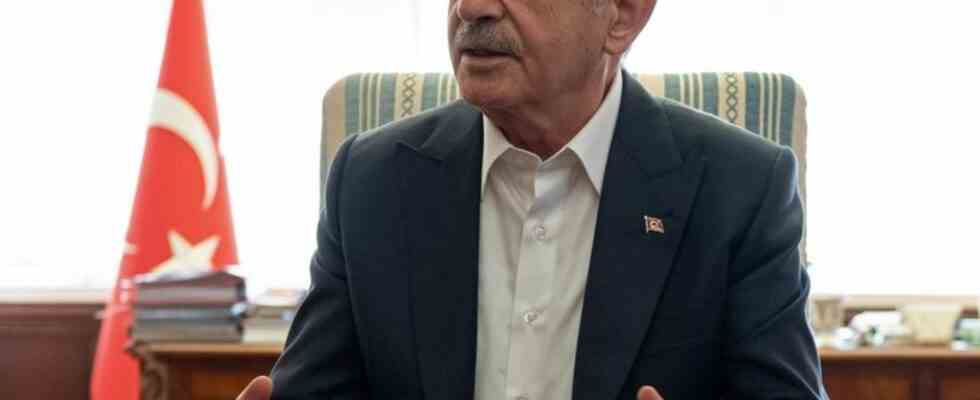Presidential elections in Turkey
Opposition leader Kilicdaroglu challenges Erdogan
Kemal Kilicdaroglu is running against Erdogan in the presidential elections. photo
© Bradley Secker/dpa
In Turkey, the alliance against President Erdogan almost collapsed over the candidate issue. Now opposition leader Kilicdaroglu is to challenge the incumbent. Can he defeat Erdogan in May?
Turkish opposition leader Kemal Kilicdaroglu will face incumbent Recep Tayyip Erdogan in the presidential election scheduled for mid-May. The 74-year-old was named joint candidate by an alliance of six parties in the capital, Ankara. There had been a tussle over the past few days for the nomination. Parliamentary elections are also scheduled to take place on May 14 at the same time as the election of the head of state. Erdogan (69) has been in power for 20 years. According to polls, he has to fear for his re-election this time.
Kilicdaroglu announced that in the event of success, the leaders of the other five parties would be appointed vice-presidents. Thousands of supporters cheered the six politicians on their joint appearance. Kilcidaroglu also campaigned for further supporters: “The door of the national alliance is wide open to everyone who shares our common dream of Turkey,” he said.
Erdogan’s re-election uncertain
The elections are seen as a real test for Erdogan. According to polls, his re-election is anything but certain. The country is struggling with massive inflation and high unemployment. After the severe earthquakes a month ago, criticism of the government’s crisis management was also voiced. Actually, the elections would not be until June. However, Erdogan wants to bring it forward to May 14. He wants to issue a decree on Friday.
The opposition alliance had previously fallen out over the candidate issue: the head of the national conservative Iyi party, Meral Aksener, initially canceled the cooperation on Friday because she did not want to support Kilicdaroglu. She favored the popular Istanbul Mayor Ekrem Imamoglu or Ankara Mayor Mansur Yavas. Now there was a compromise: If successful, the two mayors should also become vice presidents – at a time when the new president deems this appropriate.
Aksener’s withdrawal from the alliance had meanwhile caused a great deal of excitement in the opposition. She had said that the choice between Erdogan and Kilicdaroglu was “between death and malaria”. It is still uncertain whether the dispute will harm the alliance. Imamoglu was banned from politics in December. If this becomes legally binding, he may no longer hold any political office for the time being. Yavas, on the other hand, has a nationalist background that could scare off Kurdish voters. The pro-Kurdish HDP is not part of the six-party alliance, but is considered a kingmaker.
Kilicdaroglu so far unlucky
Kilicdaroglu could get votes from the Kurdish camp. It is expected that the HDP will not nominate its own candidate. Kilicdaroglu has been at the head of the opposition for almost 13 years – under his leadership his party has not yet been able to win an election against Erdogan. Opponents of his candidacy repeatedly pointed out this fact.
The 74-year-old comes from the eastern Anatolian province of Tunceli (Kurdish: Dersim) and belongs to the Alevi religious minority. The opposition leader supports his country’s EU membership and advocates a nationalist course on the refugee issue. Critics accuse him of lacking charisma. Kilicdaroglu counters that the Turks have had enough of Erdogan and his leadership style.
In a dpa interview in December, the current presidential candidate pleaded for a policy guided by “reason”. Although he is considered a poor campaigner, he is a good mediator with diplomatic skills and a willingness to compromise. In addition to the CHP and the Iyi party, four smaller parties belong to the alliance of six. Among them are former companions of Erdogan such as ex-Prime Minister Ahmet Davutoglu.
Erdogan’s Islamic-conservative AKP is running in alliance with the ultra-nationalist MHP and the small, nationalist-religious BBP. Much of the media is under government control, and the judiciary is considered politicized. A large number of Turks who are entitled to vote live in Germany. In the 2018 vote, there were 1.4 million.

